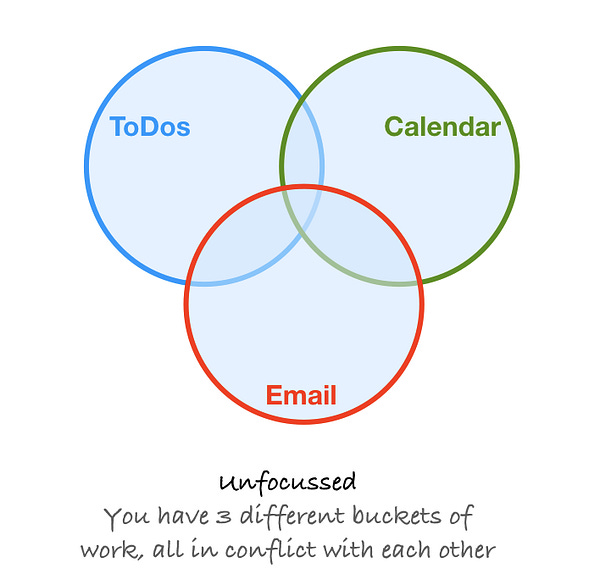Your Actual Task List
Why Managing Time is the Key to Flow
That Tweet is from 6+ years ago! And yet I, and I’m sure many others, still struggle with mistaking the inbox as the TODO list. And now we have multiple inboxes! The email inbox, the calendar notifications, the Slack messages - all independent, nagging, streaming reminders of work that needs to be done…or does it?
Who decided it needed to be done? Whether urgently or if at all, who decided it needed to be done? Who determined it was a priority?
There is one common thread between all the emails, invites, and messages: THEY DIDN’T COME FROM YOU!
By internalizing the constant pressure to keep up with them, you are abdicating control of your task list and ultimately your ability to achieve flow. And that was the whole point of organizing your work to begin with - to produce meaningful outcomes and make an impact through focus, not to check things off as they come through for the illusion of progress and perception of productivity.




So how do you wrestle back control?
There is a longer set of tips I’ll share in a future post about time management (which is the crux of being not only efficient but also effective), but today I’d like to walk through some TODO list management schemes I’ve developed.
Focus Requires Time - obvious, but before actually starting on any task it’s important to agree with yourself that it’s a task worthy of your time, that you uniquely are positioned to accomplish it, and it should be at the top of your list versus everything else on your plate…if any of that is not true, then you’re not really focusing…going off what others want you to do or some other urgency driver should not be your default!
Operating Horizons Matter - we tend to add things to our TODO lists indiscriminately, and items that have different pay-off timelines (day, week, month, year, decade) tend to be judged equally; this has 2 side-effects: (1) we tend to pick the short-term stuff because it’s easier to finish and (2) the long-term stuff just piles up and starts to feel impossible…breaking down the long-term stuff is a good way to level the playing field, but also asking yourself what type of time horizon you want to operate on is also critical…operating on a daily cadence should not be your default!
Cognitive Load Distracts - this one might just be me, but seeing everything on my TODO list at once, especially if it’s not getting crossed off at a reasonable pace, just becomes a mental burden, and I spiral on the length of the TODO list versus actually progressing on 1 thing at a time…my hack around this has been to move recurring items, upcoming TODOs, collaborative work to my calendar…schedule when to introduce latent tasks to your TODO list versus it being ever-present…being over-whelmed should not be your default!
Priorities Split Attention - priorities as a word never made sense to me, it’s supposed to be priority…I’m not saying don’t prioritize your list, I’m saying a prioritized list has 1 thing at the top…and in order to actual prioritize, you have to do all of the things above (spend time, create focus, establish horizons, remove distractions)…multi-tasking should not be your default!
Waiting Isn’t Working - how many things are on your task list right now that are waiting on something from someone? it should be none; anything that requires input from someone else should be a task on their list, an email, a meeting, etc…a well-groomed list is only things that you can execute on versus having to chase others…dependency management should be your default!
Cues Enable Context - I love to use environment to put myself in the right state of mind to get things done…if you want to read more, keep the Kindle on your nightstand and plug in your phone out of reaching distance…I use this trick with my TODO list my creating separate Google Calendars for every family of tasks…so you could have a home remodel calendar that you make the default on weekends to get yourself focused on your renovation….a consolidated view should not be your default!
Habits Need Nurturing - finally, so much of focus is being intentional by building good habits, but these don’t happen over-night…I use time tracking, daily journaling, monthly retrospectives, and project post-mortems to figure out any systemic issues with the way I’m approaching my productivity goals…one of the traps I tend to fall into and the question I ask myself regularly is whether I’m being just efficient or truly effective…unintentional should not be your default!
I’d love to hear from readers on how they find focus in the era of infinite scroll TODO lists - please chime in via comments👇. And if you enjoyed this post, please consider subscribing.
further reading / references
a Spark File is a great way to track ideas and experiments to build better habits
if you liked Des Traynor’s Tweet above, he has a Coda-based productivity guide
the founder of Coda talking about taking control of your time (and above Tweet)
Jeff Bezos explaining the need to focus on a few, quality decisions vs volume
my prior Much TODO About Nothing post about how I manage my task list
this Tim Kreider essay highlights lack of focus as people fall into the “busy trap”
childish drawing / interpretation



